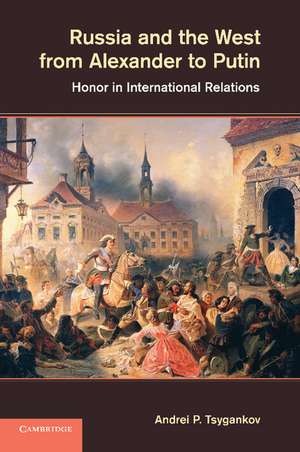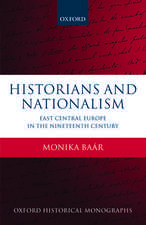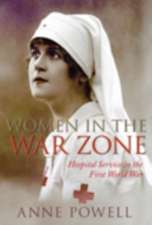Russia and the West from Alexander to Putin: Honor in International Relations
Autor Andrei P. Tsygankoven Limba Engleză Paperback – 5 mar 2014
| Toate formatele și edițiile | Preț | Express |
|---|---|---|
| Paperback (1) | 287.28 lei 6-8 săpt. | |
| Cambridge University Press – 5 mar 2014 | 287.28 lei 6-8 săpt. | |
| Hardback (1) | 756.70 lei 6-8 săpt. | |
| Cambridge University Press – 27 iun 2012 | 756.70 lei 6-8 săpt. |
Preț: 287.28 lei
Nou
Puncte Express: 431
Preț estimativ în valută:
54.98€ • 59.70$ • 46.18£
54.98€ • 59.70$ • 46.18£
Carte tipărită la comandă
Livrare economică 22 aprilie-06 mai
Preluare comenzi: 021 569.72.76
Specificații
ISBN-13: 9781107668034
ISBN-10: 1107668034
Pagini: 330
Ilustrații: 6 b/w illus. 17 tables
Dimensiuni: 152 x 229 x 18 mm
Greutate: 0.44 kg
Editura: Cambridge University Press
Colecția Cambridge University Press
Locul publicării:New York, United States
ISBN-10: 1107668034
Pagini: 330
Ilustrații: 6 b/w illus. 17 tables
Dimensiuni: 152 x 229 x 18 mm
Greutate: 0.44 kg
Editura: Cambridge University Press
Colecția Cambridge University Press
Locul publicării:New York, United States
Cuprins
1. Introduction; Part I. Theory: 2. Honor in international relations; 3. The Russian state and its honor; 4. Russia's relations with the West; Part II. Honor and Cooperation: 5. The Holy Alliance, 1815–53; 6. The Triple Entente, 1907–17; 7. The collective security, 1933–9; 8. The war with terrorism, 2001–5; Part III. Honor and Defensiveness: 9. The Recueillement, 1856–71; 10. The peaceful coexistence, 1921–39; 11. Containing NATO expansion, 1995–2000; Part IV. Honor and Assertiveness: 12. The Crimean War, 1853–6; 13. The early Cold War, 1946–9; 14. The Russia-Georgia War, August 2008; 15. Conclusion; Bibliography.
Recenzii
'An original analysis of the long sweep of Russian foreign policy over the last two centuries, examined through the prism of the concept of 'honour'. The work provides a convincing framework for analysis based on three modes of Russian behaviour, cooperation, defensiveness and assertiveness. The notion is then applied in ten cases studies, ranging from the Holy Alliance of 1814–53 to the Russo–Georgian war of 2008, in which honour is seen to have played a central role in shaping policy and perceptions. Tsygankov offers a compelling and original analysis of Russian foreign policy that will be essential reading for historians and political scientists, and above all for scholars of international relations.' Professor Richard Sakwa, University of Kent
'In a sweeping historical analysis, Tsygankov explains major shifts in Russia's willingness to cooperate with the West in terms of honor. All states have a set of core values that must be defended in order to maintain national dignity and self-respect, a commitment that explains why states sometimes engage in foolhardy or wasteful undertakings. Tsygankov brings to bear his considerable expertise without ostentation to write a simple, yet highly informative analysis of Russian foreign policy. This succinct and elegant book is essential reading for understanding Russia's foreign policy today.' Deborah Welch Larson, University of California, Los Angeles
'Andrei Tsygankov's work on the role of honor in Russian foreign policy makes a very important contribution not only to Russian historical studies but also to international relations theory.' Professor Anatol Lieven, Kings College London
'… a clear and distinct argument about why Russia acts in the way that it does and how international engagement with the Kremlin might be structured to achieve more cooperative outcomes … This book not only highlights perhaps the most important driver of contemporary Russian foreign policy, but it also explains why Russia's controversial stance on issues such as the Syrian conflict, which has isolated it internationally, continues to be supported by the larger Russian public.' Slavic Review
'In a sweeping historical analysis, Tsygankov explains major shifts in Russia's willingness to cooperate with the West in terms of honor. All states have a set of core values that must be defended in order to maintain national dignity and self-respect, a commitment that explains why states sometimes engage in foolhardy or wasteful undertakings. Tsygankov brings to bear his considerable expertise without ostentation to write a simple, yet highly informative analysis of Russian foreign policy. This succinct and elegant book is essential reading for understanding Russia's foreign policy today.' Deborah Welch Larson, University of California, Los Angeles
'Andrei Tsygankov's work on the role of honor in Russian foreign policy makes a very important contribution not only to Russian historical studies but also to international relations theory.' Professor Anatol Lieven, Kings College London
'… a clear and distinct argument about why Russia acts in the way that it does and how international engagement with the Kremlin might be structured to achieve more cooperative outcomes … This book not only highlights perhaps the most important driver of contemporary Russian foreign policy, but it also explains why Russia's controversial stance on issues such as the Syrian conflict, which has isolated it internationally, continues to be supported by the larger Russian public.' Slavic Review
Descriere
Covering two centuries of Russian history, this book shows how a sense of honor has affected Russia's foreign policy decision-making.












